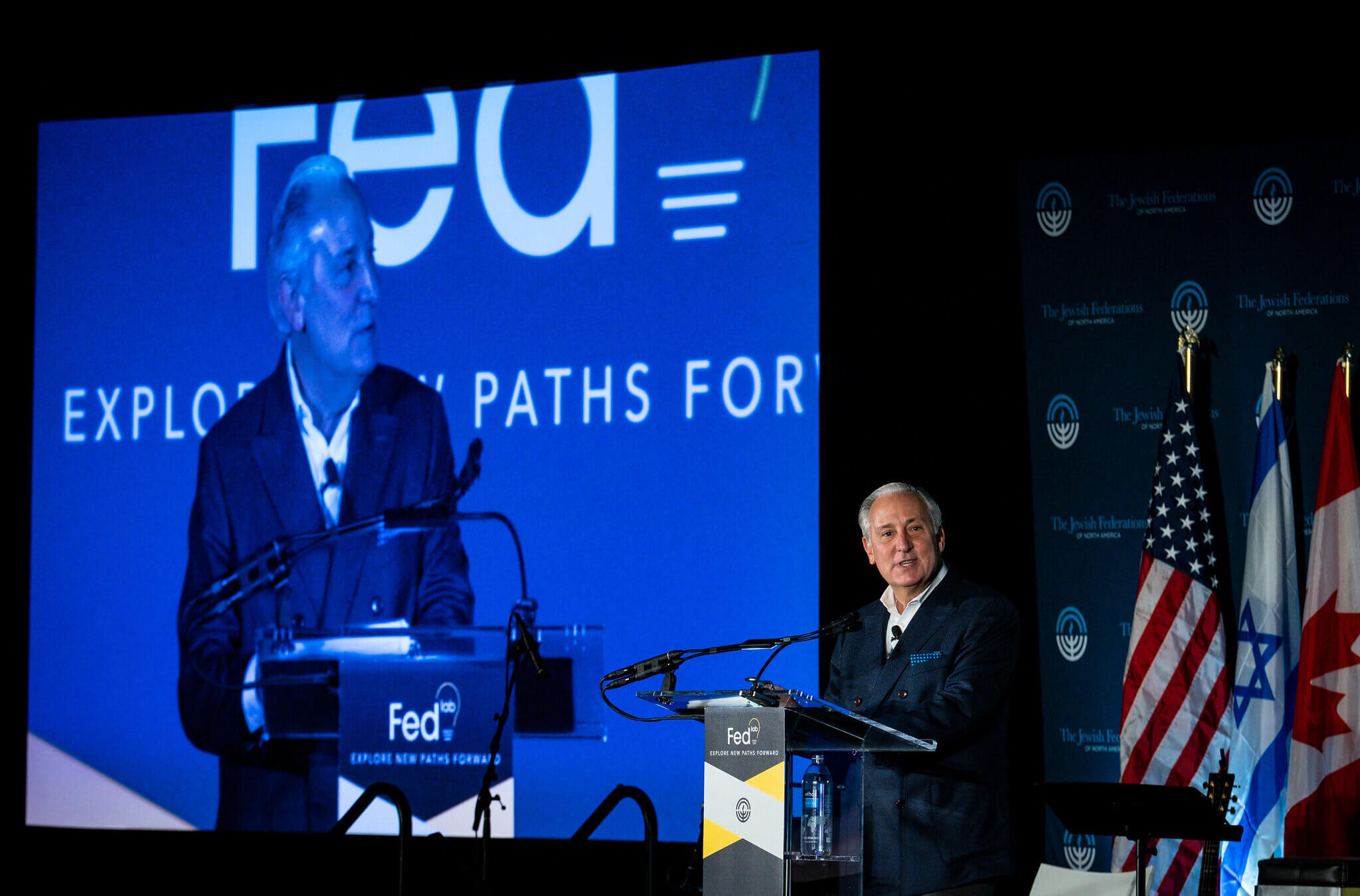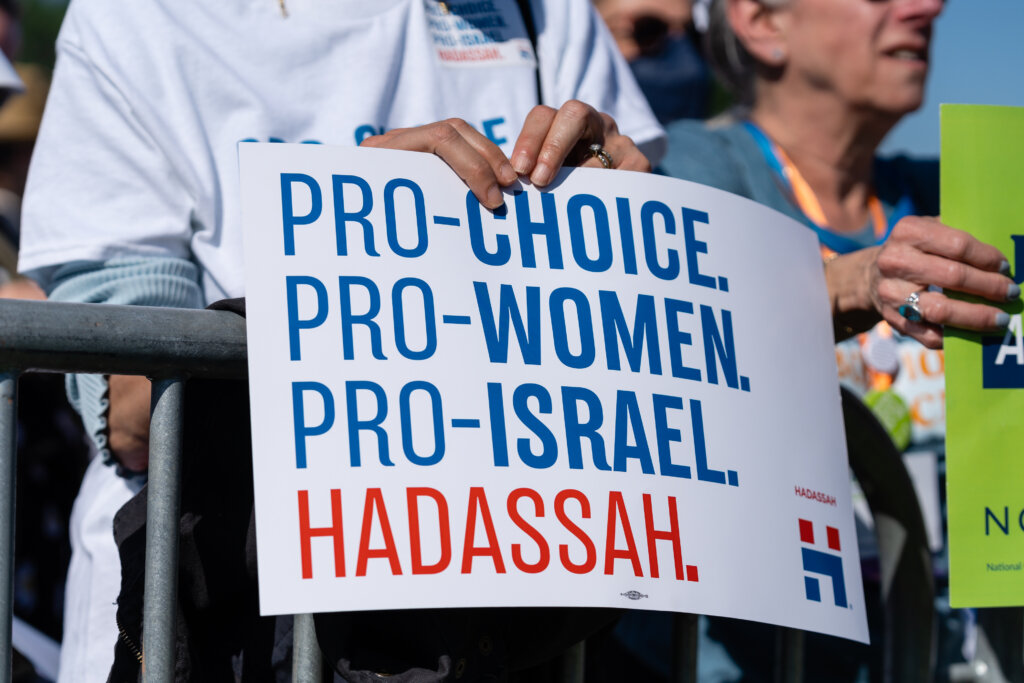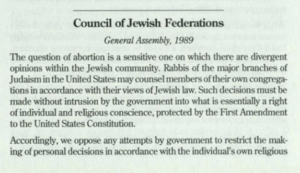Under pressure, Jewish federation network announces opposition to abortion ruling
After calls from Jewish feminists, including a Chicago congresswoman, CEO says group is ‘concerned about the risks it poses to women and girls’

Eric Fingerhut, head of the Jewish Federations of North America, speaks at the organization’s 2019 conference. Fingerhut released a statement opposing the Supreme Court’s decision to overturn Roe v. Wade on Wednesday, nearly a month after the ruling was released. Photo by Jewish Federations of North America
Nearly one month after the Supreme Court overruled Roe v. Wade, the Jewish Federations of North America said Wednesday that it disagrees with the decision, belatedly joining legions of other Jewish nonprofits.
The statement came after pressure from a member of Congress and feminist activists, and in response to inquiries from the Forward about the group’s silence on the issue since a draft of the ruling ending the constitutional right to abortion was published on May 3.
“Like the majority of the Jewish community, we disagree with the Dobbs decision and are concerned about the risks it poses to women and girls,” said Eric Fingerhut, head of the group, the umbrella network for more than 100 local federations across the country and a leading Jewish policy voice in Washington.
The organization, known as JFNA, had come under fire from longtime Rep. Jan Schakowsky, a Chicago Democrat, during its May policy conference in Washington, a week after the leak of the draft majority opinion in the case, Dobbs v. Jackson Women’s Health Organization. Abortion was not on the conference’s advocacy agenda.
“Now, more than ever, we need Jewish moral leadership to speak out for reproductive health, rights, and justice,” Schakowsky said in an email to the Forward. A spokesperson confirmed that she had shared the same sentiment at the policy conference.
JFNA continued to avoid taking a stand when the ruling was officially announced on June 24.
While other Jewish establishment stalwarts including the American Jewish Committee and Anti-Defamation League harshly condemned the decision and stated their support for abortion access, JFNA simply described it as a “monumental case” in a statement shared on a July 18 webinar for local federations and carefully worded to avoid taking sides.
“The issue of reproductive rights is of great importance,” the organization said. “We know this decision will have a tremendous impact on our communities.”
Asked about this, Niv Elis, a spokesperson for the group, said on Tuesday that JFNA was “focusing on its repercussions for our communities, not the decision itself.”
But after the Forward asked for clarification around the group’s position on abortion, and shared with Elis a 1989 resolution from JFNA’s predecessor organization supporting legal access to the procedure, he sent Fingerhut’s statement Wednesday evening opposing the Dobbs decision.
“Our focus from the minute the decision came down was to mobilize our expertise in health issues and government relations at the state and federal level to ensure our communities can protect women’s and girls’ health,” Fingerhut added. “That’s what federations do.”
Community’s position
American Jewish opinion on abortion is less divided than virtually any other political issue. Scores of local and national organizations quickly denounced it; some 2,000 clergy have joined an abortion-rights initiative organized by the National Council of Jewish Women, Rabbis for Repro, and an alphabet soup of Jewish groups mobilized for a rally in Washington that the organization hosted in May. Concern over the decision spanned the religious spectrum. The Orthodox Union voiced its opposition to complete abortion bans and said it was unable to “mourn or celebrate” the court ruling. The Haredi group Agudath Israel also disagrees with total restrictions on abortion, though it applauded the Supreme Court decision.

The Pew Research Center found that 83% of American Jews think abortion that it should be legal in all or most circumstances. That is far more than the 61% in the population overall — and much more than the share of Jews who are aligned with some of JFNA’s other policy positions.
For example, the day before the Dobbs ruling, the organization cheered a federal court ruling upholding an Arkansas law targeting the movement to boycott Israel. Pew’s research shows that 43% of Jews in the United States are aware of and oppose the Boycott, Divestment and Sanctions campaign, while a similar share are unfamiliar with it.
JFNA’s May conference in D.C. where Schakowsky voiced her concern over the lack of activism on abortion was focused on lobbying in favor of aid for Ukrainian refugees and stopping antisemitism.
JFNA did recently host a webinar featuring speakers who support abortion rights, where it distributed a handout of statements from Jewish organizations on reproductive rights – including the Dobbs condemnations from ADL and AJC, as well as similar missives from the Jewish Council for Public Affairs, the Reform and Conservative movements and nine local Jewish community relations councils. Agudath Israel’s was the only statement in the bunch that supported the overturning of Roe.
“The Jewish community is not a monolith and Jews disagree on many issues,” the JCRC of Greater Toledo said in its statement. “However, compared to most issues, supporting abortion rights is a consensus issue in the American Jewish community.”
JFNA’s decision not to speak out in favor of abortion rights over the last three months “surprised” some local federation leaders, according to one federation executive who spoke on the condition of anonymity to avoid backlash for questioning the national group. “I thought they would have developed something that goes along the lines that this ruling is against our First Amendment rights as Jews,” the executive said.
Sheila Katz, chief of the National Council of Jewish Women, said her organization has been pushing “all Jewish organizations to take a public position in support of abortion access.”
Other leaders were less concerned. “We have not given any thought to what statements JFNA has made,” said Howard Libit, director of the Baltimore Jewish Council, which reiterated its support for reproductive rights after the Dobbs decision.
Historic support
The Council for Jewish Federations, which merged with the United Jewish Appeal to form JFNA in 1999, took a position in favor of “the freedom of reproductive choice” more than 30 years ago.
Abortion “decisions must be made without intrusion by the government into what is essentially a right of individual and religious conscience, protected by the First Amendment to the United States Constitution,” the council wrote in “We Affirm,” a pamphlet created by Religious Coalition for Abortion Rights in 1991. “Accordingly, we oppose any attempts by government to restrict the making of personal decisions in accordance with the individual’s own religious and moral views whether through administrative regulation, legislation or the courts.”

That statement was passed during the council’s 1989 general assembly, a gathering where leaders of local federations could bring resolutions for the broad membership to discuss and vote on. JFNA no longer uses that process; instead, its public affairs staff drafts policy under guidance of its board and executives.
Other major Jewish groups said they had rooted their anti-Dobbs statements in their own longstanding support for abortion access. The ADL, for example, said it had supported “full access to reproductive care” since 1980, while the AJC has supported abortion rights since 1974 and in 1989 came out in favor of public funding for abortions and against almost any restrictions on the procedure.
Fingerhut, who took over as chief of JFNA in 2019, supported Roe v. Wade during his time as a Democratic elected official and political candidate in Ohio. The new chair of the organization’s board is Julie Platt, a former banker and the mother of Broadway star Ben Platt, who wore a “Choice” button when he sang the national anthem at Major League Baseball’s All-Star Game Tuesday evening.
But Andrew Hochberg, the chair of the board’s domestic policy and government affairs committee, is a major donor to Republican candidates and gave the maximum legal contribution to John Kasich’s presidential campaign in 2016. Kasich supported harsh restrictions on abortion during his eight years as Ohio governor, ending in 2019.
Hochberg did not respond to a request for comment.
A message from our Publisher & CEO Rachel Fishman Feddersen

I hope you appreciated this article. Before you go, I’d like to ask you to please support the Forward’s award-winning, nonprofit journalism so that we can be prepared for whatever news 2025 brings.
At a time when other newsrooms are closing or cutting back, the Forward has removed its paywall and invested additional resources to report on the ground from Israel and around the U.S. on the impact of the war, rising antisemitism and polarized discourse.
Readers like you make it all possible. Support our work by becoming a Forward Member and connect with our journalism and your community.
— Rachel Fishman Feddersen, Publisher and CEO




























